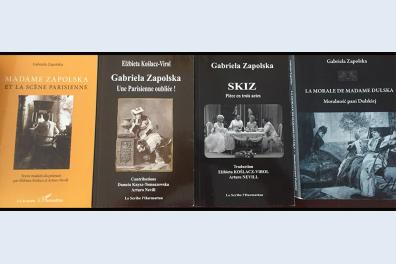International symposium "The world of Gabriela Zapolska, cultural transfers and the women's question at the turn of the 19th and 20th centuries", September 27-28

Event organized by the Centre de recherche Europes-Eurasie - CREE (Inalco, France), the Department of Interdisciplinary Philological Research of the University of Białystok (Poland), the Department Number 1 of Philology of the Polish Academy of Arts and Sciences (Poland), the National Academy of Sciences of Ukraine, branch in Lviv (Ukraine).
Tuesday, September 27, 2022 - PLC (Paris 13e) - Auditorium
Inalco, 65, rue des Grands Moulins - Paris 13e
Wednesday, September 28, 2022 - Maison de la recherche ( Paris 7e) - Auditorium Dumézil
Inalco, 2 rue de Lille - Paris 7e
The world of Gabriela Zapolska, cultural transfers and the female question at the turn of the 19th and 20th centuries between Krakow-Lwów (auj. Lviv)-Warsaw, Paris, Brittany and Vienna
Writer, playwright, reporter and actress, Gabriela Zapolska was a major figure in Polish and European cultural life at the turn of the 19th and 20th centuries (1857-1921). Her many ties with France are based on an excellent knowledge of the French language and a six-year stay in the hexagon between 1889 and 1895. Zapolska appeared on the stages of the Théâtre Libre d'Antoine and the Théâtre de l'Œuvre of the symbolist Lugné-Poe, and was engaged to the painter Paul Sérusier. In Poland (and abroad, particularly in Vienna and Hungary), her most famous play is La Morale de Madame Dulska, translated into French by Paul Cazin in 1933 (and revised by Cécile Bocianowski in 2011).
Zapolska is the author of 41 plays, 23 novels, 177 short stories, 252 press articles including reports and literary and artistic criticism, a screenplay, poems and 1,500 letters.
Zapolska's work and biography continue to provide food for thought for sociologists, historians, philosophers and, of course, specialists in literature and/or theater (Anna Janicka) - more recently, her work has been reread through the prism of gender and feminist criticism, given that Zapolska's favourite themes include "the various aspects of women's condition in a male-dominated society" (Knysz-Tomaszewska) and the multi-layered portrayal of female sexuality as taboo, more or less repressed and unconscious. Added to this are recent efforts (Piotr Biłos) to show that Zapolska's theater appears as a liminal stage in the development of Polish philosophical theater of revolt and social conflict that marked the twentieth century through authors such as Witold Gombrowicz or Sławomir Mrożek. Zapolska has also made a living from her writing. In France for many years, Gabriela Zapolska found a fervent propagator in Elżbieta Koślacz-Virol, to whom we owe numerous translations, public readings and works written in French.
This colloquium aims to make the state of research on Zapolska, her literary, theatrical and journalistic output, accessible in French, and thus give impetus to future French research. It follows on from the 1st colloquium entitled "Gabriela Zapolska: Biography - Aesthetics - Ideas", held in Białystok on September 24 and 25, 2021.
The aim will be to explore issues such as:
- Zapolska and artistic bohemia at the turn of the 19th and 20th centuries.
- Polish and Central European actresses, writers and artists at the turn of the centuries
- The experience and reception of French theater in the works of Zapolska and other women writers from East-Central Europe.
- Zapolska correspondent for the Polish press in Paris
- Zapolska's cities: Paris, Lwów (Lemberg/Lviv), Kraków (Kraków) and others (certain regions such as Brittany)
- France and the French in Zapolska's correspondence.
- Translation, reception and adaptations, Zapolska in France: state of the art, translations, presence/absence.
- Zapolska's ideas on female emancipation in relation to French and European conceptions: can we speak of a model?
- Cultural transfers in Zapolska's work (born of her direct experience of European realities)
- The correspondence of the arts (literature, theater, painting...), genres (novel/drama/reportage/short stories) and writings from the point of view, for example, of the (self-)adaptation to the stage of novels (such as Małaszka or Cathy the Caryatid)
- Universality or atemporality: beyond the realities and social parameters of the time, Zapolska's works tackle existential and metaphysical problems (the question of evil) and raise aesthetic questions that transcend the context of the time
- The link between moral revolt, instinctive impulses (of sexuality in particular) and fatality
- Articulation between feminism, women's emancipation, (the break-up of the) family, social rules
- Evolution of critical trends, new views and new approaches
Members of the organizing and/or scientific committee
Anna Janicka, PU, University of Białystok
Jolanta Gadek, Podlachie Archive Fund
Piotr Biłos, PU, Inalco, Paris
Jewhen Nachlik, PU, National Academy of Sciences of Ukraine, Lviv
Jarosław Ławski, PU, University of Białystok
Lucjan Suchanek, PU, Polish Academy of Arts and Sciences